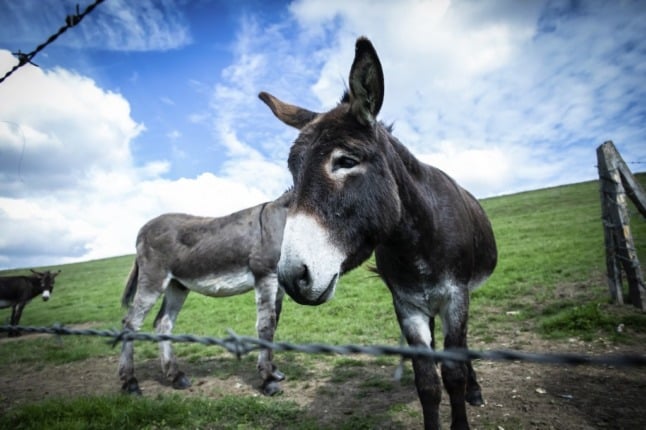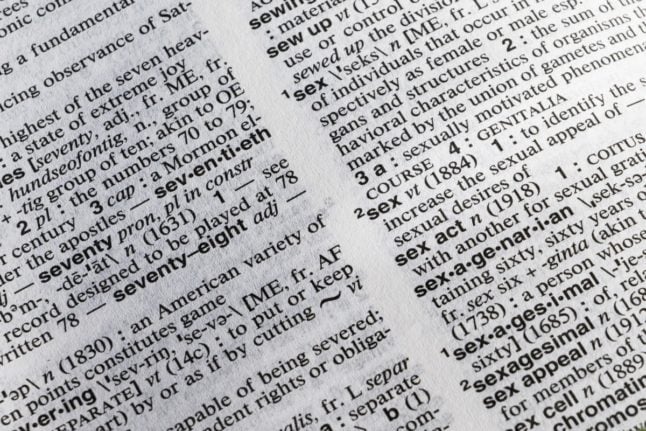Author and decade-long resident of France Piu Eatwell has put together a volume of trivia about France – in English – for those who just can’t get enough of this country, entitled “F is for France”.
The author describes it as a “tribute to everything eccentrically, paradoxically, surprisingly and delightfully French” and it runs from A for Absinthe to Z for Zinedine Zidane.
Here are some of The Local’s favourite weird facts mentioned in the book.
1. You can commit “intellectual infidelity”
Under French law, infidelity can be “intellectual” as well as physical. In other words, excessive smoking, playing too much soccer, spending too much time with the local bishop, and phone sex can all be grounds for divorce.
In 1986, a French court granted a divorce to a husband on the grounds of the “intellectual infidelity” of his wife. The reason for the divorce was that the wife had allowed a rival to assume intellectual precedence in her thoughts over her husband, thus giving her husband the impression that she considered him worthless.

2. Don’t slander the donkeys
Contrary to their reputation for indifference to animals, the French can be extraordinarily caring to them. In the Breton village of Saint-Léger-des-Prés, for example, it is illegal to slander donkeys by the use of such insulting terminology as “jack-ass,” “dumb as an ass,” etc.
Anybody breaking this law is required to make amends by offering apologies in the form of carrots or sugar lumps to the donkeys residing within the boundaries of the commune. The law was introduced in 1991 by the then mayor of Saint-Léger-des-Prés, who was inordinately (perhaps overly) fond of donkeys.
3. There’s a blood pudding competition
Boudin noir is a form of blood sausage, similar to black pudding in the UK, and the best place to savour this is the town of Mortagne au Perche in Normandy, which has a special boudin festival in March, including a competition to see who can eat the most (up to three miles of boudin are regularly consumed).
Proceedings are monitored with an eagle eye by the Confrérie des Cheva-liers du Goûte- Boudin (“Fraternity of the Knights of the Blood- Sausage Tasters”).
Over half the world’s traffic roundabouts are to be found in France, which, with more than thirty thousand roundabouts, has more ronds-points than any country in the world
5. The case of the mystery theatre in the catacombs
The catacombs beneath the streets of Paris are open to the public, but only in certain tightly-controlled areas. The remainder is strictly off limits, but that has not stopped a hardy group of adventurers – the cataphiles – from exploring their depths.
In 2004, police patrolling the underground passages found an entire theatre with seating concealed in a vast 4,300-square-foot cave under the chic 16th arrondissement, equipped with a bar, pressure cooker for making couscous, stock of 1950s noir films, and contemporary cave paintings on the walls. When the police returned later with electricians to investigate the power source, they found that the lines had been cut, and a note had been left that read “Do not try to find us.”
6. Champagne glasses modelled on Marie Antoinette’s breast?
Legend has it that the classic Champagne glass or “coupe” was adapted from a wax mould of the left breast of Marie Antoinette.
The rather more likely – albeit prosaic – theory is that the coupe was designed for sparkling wine in England around 1663, and thus predated both Champagne and Marie Antoinette by almost a century. Nevertheless, the story inspired the sculptor Jane McAdam Freud to design a Champagne coupe moulded on the fashion model Kate Moss’s left breast, for the celebration of the model’s twenty five years in the business in 2014.
7. Marrying the dead
In France, it is possible with the permission of the president, to marry a dead person.
Posthumous marriage originated in the 1950s, when the fiancée of a man killed after a dam burst in the town of Fréjus applied to the then president, Charles de Gaulle, to carry through the couple’s marriage plans and was granted permission. Since then, applications have been made, and succeeded at various times, for posthumous marriage under this law.
8. Mayday, Mayday
The international distress code “Mayday” comes from he French M’aidez, meaning “Help me!” Under the rules of radio signaling code, the word should be repeated three times (Mayday- Mayday- Mayday) by a vessel or aircraft in a life-threatening situation.
The word as a distress code was coined in 1923 by Frederick Stanley Mockford, a senior radio officer at Croydon airport, near London. Mockford was asked to think of a distress call that would be understood by all pilots and ground staff, and as much of the traffic at that time was between Croydon and Le Bourget airport, he hit on the idea of using the word “Mayday.”

9. The Eiffel Tower is married
In 2008, a woman married the Eiffel Tower, changing her name to Erika La Tour Eiffel in honor of her “partner.”
Erika, an ex-soldier who lived in San Francisco, had a history of “object fetishism,” and admitted to a past crush on the Berlin Wall. There are believed to be about forty “objectum-sexual” people in the world, mostly women.
10. No trousers for women
Women in Paris are forbidden to wear trousers, unless riding a bicycle or a horse.
The law – which dates from the 1800s – was originally introduced to dissuade the cross- dressing inclinations of the likes of author George Sand. The law is still, technically, in force. However, in 2013 the French Equality Minister stated that it has implicitly been overruled by subsequent legislation putting women on an equal footing with men.
11. Male impotence – a crime?
Not surprising, many gentlemen failed this audition. There was, however, a second chance. Should one wilt under scrutiny, one could request a “Trial by Congress,” which entailed husband and wife performing sex before the judges. The practice was declared obscene and banned in 1677.
12. The French typists’ phrase
Whereas the traditional English typists’ warm-up is “The quick brown fox jumped over the lazy dog,” French typists can use the phrase “Allez porter ce vieux whisky au juge blond qui fume un havane,” as it contains every letter in the alphabet. The phrase translates as – Take this old whiskey to the blond judge who is smoking a cigar.
13. World’s first department store was in Paris
The world’s first department store was founded by Aristide Boucicaut in Paris, in 1838.
The store, Le Bon Marché, became a centre for innovation and the development of modern shopping concepts including advertisements, browsing, and fixed prices. Boucicaut has been hailed as a genius, introducing the nineteenth-century middle-class woman to the pleasures of browsing in a store.
14. Illegal potatoes
Potatoes were once illegal in France. Known as “hog feed,” they were banned by the French parliament in 1748 on the basis that they caused leprosy, among other things (possibly because they are related to deadly nightshade, as are the tomato and tobacco plants).
Largely due to the efforts of pioneering army pharmacist Antoine- Augustin Parmentier (1737–1813), the Paris Faculty of Medicine finally declared potatoes edible in 1772.
15. English slang mocks the French

More than 75 percent of the slang English language phrases containing the word “French” are connected with sex. They include: French letter (condom), French maid, French pox or French disease (syphilis), French kissing, and Frenching (fellatio).
Interestingly, many of these phrases are reversed the other way: a French slang term for condom is capote anglaise (English hood), and syphilis was referred to as la maladie anglaise.
16. And lastly… Be polite!
A mayoral decree of the village of Lhéraule, in the Picardy area of northern France, imposes a minimum level of politeness in the town hall. The rule is that you can be thrown off the premises if you don’t use basic social graces such as saying “Hello,” ‘Thank you,” and “Good-bye.”
Want more fun facts? You can buy F is For French here (in book form or on Kindle).



 Please whitelist us to continue reading.
Please whitelist us to continue reading.
Thanks for this amusing post. Here are some notes from an old pedant: 8. “m’aidez” doesn’t mean “Help me” – that would be “aidez moi”. The correct form is “m’aider”, as in “Pouvez-vous m’aider ?” 12. The correct English sentence is “The quick brown fox JUMPS (not “jumped”) over the lazy dog, otherwise there would be no “s” in the sentence.